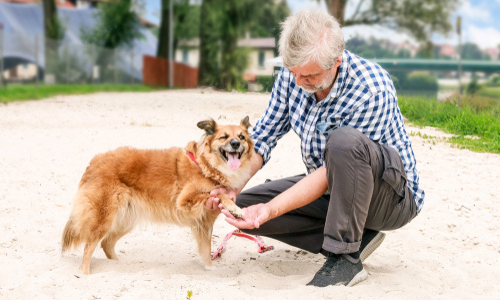
How to Keep Your Pets Safe This Summer
Your cat or dog probably enjoys the beautiful summer weather just as much as you do. Unfortunately, your pet's chance of developing a heat-related illness or injury rises with the temperature. Whether your furry friend enjoys romps in the park with you or never ventures beyond your backyard, these tips can help him or her stay safe this summer.
Limit Outdoor Time on Hot, Humid Days
Heat and humidity levels affect your pet's health and comfort. While some animals tolerate heat and humidity fairly well, others can quickly become overheated. Reduce the risk of heatstroke by restricting outdoor play time to the cooler morning or evening hours.
If there's an excessive heat warning for your area, don't let your pet spend hours outside in the hot sun. Your dog or cat will be much comfortable indoors where heat and humidity can be controlled by air-conditioning and fans.
When your pet does spend time outdoors, provide plenty of fresh, cool water and a shady, well-ventilated resting place. Dog houses may offer shade, but they trap the heat and quickly become uncomfortably hot.
Puppies, kittens, older pets, pets with health conditions, or pets that have short muzzles might be more affected by heat and humidity and may experience heat exhaustion or heatstroke symptoms sooner than other pets.
Monitor your pet carefully for signs of heatstroke. They include:
- Heavy Panting
- Rapid Heart Rate
- Weakness
- Dizziness
- Dry Nose
- Sunken Eyes
- Lack of Coordination
- Change in Tongue Color
- Drooling
- Vomiting or Diarrhea
Bring your pet inside immediately if you notice these symptoms. Use a washcloth soaked in cool, not cold, water to ease heatstroke symptoms, and call your pet's veterinarian immediately.
Protect Your Pet's Paws
Concrete, sand, asphalt, wood, and metal surfaces become unbearably hot after just a few hours of direct sun exposure. If you wouldn't walk barefoot on these surfaces, your pet shouldn't either.
A few years ago, the Kansas City Star conducted a test to check the temperatures of various surfaces on a hot day. The infrared thermometer they used registered an uncomfortably high 144.6 degrees Fahrenheit on the newspaper's asphalt parking lot.
At these temperatures, burns to the paw pads can occur after just a few seconds. If your dog or cat normally spends time outdoors on potentially hot surfaces, avoid middle-of-the-day walks or outdoor play sessions.
The surfaces will likely be much cooler early in the morning or in the evening. Your pet may find it more comfortable to walk on grassy areas when paved or wooden walkways become too hot.
Follow Car Safety Recommendations
Does your dog look forward to car rides to the local dog park? Door handles, dashboards and even seatbelts can also burn your pet. Seatbelt buckles registered temperatures of 130 degrees during the Kansas City Star's examination of summer temperature hazards. Prevent burns by turning on the air-conditioning a few minutes before you plan to leave, and place a blanket over seats and seatbelt buckles.
Never leave your pet in a car, even with the windows open. On a 70-degree day, temperatures inside a vehicle can increase to 89 degrees after 10 minutes and soar to 104 degrees after 30 minutes, according to the American Veterinary Medical Association. When the outside temperature is 80, those figures increase to 104 degrees after 10 minutes and 119 after 30 minutes.
Examine Your Pet's Paws After Trips Outside
Paw pad inspections are a must after your cat or dog has been outside during the summer. Look for burns or cuts on the surface of the paw pads, then check for small sticks and stones, debris, thorns, or small pieces of glass that may be trapped between your pet's toes.
Use Paw Protectors
Paw protectors help your pet avoid burns and cuts and offer a little extra cushioning and traction. Some protectors attach to pads with adhesive, while others slide over the feet and are held in place with straps.
It may take a little while for your pet to get used to wearing protectors. If you choose products that fit like boots or socks, help your pet adjust to the footwear by increasing wear time gradually.
Do you have a question or concern about your pet's health? Contact our office and let us know how we can help.
Sources:
American Veterinary Medical Association: Estimated Vehicle Interior Air Temperature v. Elapsed Time
WebMD: Top 10 Paw Care Tips for Dogs
Pet Life Today: The Best Dog Paw Protectors (2020 Reviews), 2/4/20
Cattime.com: 5 Ways to Keep Your Outdoor Cat’s Paws Safe from Hot Pavement
